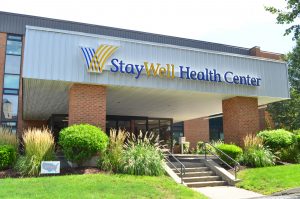April 4, 2022
 National Public Health Week falls during the first week of April every year to recognize the contributions of public health and highlight issues that are important to improving the health of our nation. One thing we have all learned throughout the last two years of the Covid-19 pandemic, is that the health of one person can affect the health of an entire community.
National Public Health Week falls during the first week of April every year to recognize the contributions of public health and highlight issues that are important to improving the health of our nation. One thing we have all learned throughout the last two years of the Covid-19 pandemic, is that the health of one person can affect the health of an entire community.
Each year Public Health Week has a theme and this year the themes is “Public Health is Where you Are”. The goal is to help people understand that while there are public health resources available in most communities, there are barriers that make it harder for some people to access them. The sooner we understand the barriers, the sooner we can combat them to ensure that people have access to the healthcare they need where they live.
There are several barriers that limit people from accessing care including physical, mental, financial, cultural and language barriers. In many cases, there are multiple barriers impacting why someone does not get the healthcare they need.
Physical barriers are obstacles either naturally or manmade within an environment that prevent mobility or impede necessary services such as food and healthcare. For those who do not have transportation, it can be even more difficult to make appointments if public transportation is not in close range to where they live. Individuals who have physical mobility issues may have an even harder time accessing care due to special transportation needs. While there are options like Uber and Lyft, these may not be affordable.
Mental barriers are beliefs or assumptions that a person has about themselves in regard to their potential or self-worth. Negative beliefs prevent people from accomplishing tasks to better themselves or their situation. It is no secret that the pandemic has caused a rise in mental health issues across the globe due to social isolation. For individuals who struggle with mental illness, it can be difficult to prioritize health, especially when other barriers may impact both their mental health and their ability to access services.
 Financial barriers are simply when the cost of a service or activity is difficult to afford. Health insurance can be costly, especially for individuals who are on a fixed income or earning minimum wage. Not all employers provide insurance to their employees, forcing them to look outside of their employment for alternatives. In some cases, insurance can cost most of what an individual earns in a month and therefore a difficult decision is made to go without insurance. In these cases, it can often mean that the only time they see a doctor is in an emergency, which results in high bills that they might have difficulty paying. Individuals might also feel embarrassed or ashamed at the inability to pay and therefore defer appointments with the hopes of being able to afford them in the future.
Financial barriers are simply when the cost of a service or activity is difficult to afford. Health insurance can be costly, especially for individuals who are on a fixed income or earning minimum wage. Not all employers provide insurance to their employees, forcing them to look outside of their employment for alternatives. In some cases, insurance can cost most of what an individual earns in a month and therefore a difficult decision is made to go without insurance. In these cases, it can often mean that the only time they see a doctor is in an emergency, which results in high bills that they might have difficulty paying. Individuals might also feel embarrassed or ashamed at the inability to pay and therefore defer appointments with the hopes of being able to afford them in the future.
Cultural barriers exist when an issue arises from a misunderstanding of meaning, caused by a cultural difference between multiple parties. Communities such as the LGBTQ+ community may feel like they are not accepted by providers and may hesitate to go to the doctor for fear of discrimination.
Language barriers can be as simple as an inability to speak a common language with the healthcare provider, causing communication to be ineffective. Throughout the world, people may live in the same area but have different primary languages. It can often be frustrating for providers and patients alike to try to communicate about health issues. Other communication impairments that impact vision and hearing for example, can make it difficult to communicate without assistance.
 As a community health center, StayWell has made it our purpose to deliver high-quality comprehensive services with an emphasis on preventing and combatting barriers. In order to help our patients, we offer sliding fee scales to lessen the financial burden, as well as outreach programs to link patients with insurance options and other needed resources. StayWell provides interpreters and translators to patients as needed for effective communication.
As a community health center, StayWell has made it our purpose to deliver high-quality comprehensive services with an emphasis on preventing and combatting barriers. In order to help our patients, we offer sliding fee scales to lessen the financial burden, as well as outreach programs to link patients with insurance options and other needed resources. StayWell provides interpreters and translators to patients as needed for effective communication.
In addition to those services, our Behavioral Health department works to help patients overcome issues they are struggling with. The community programs team works to create building blocks to reach health goals and personal development.